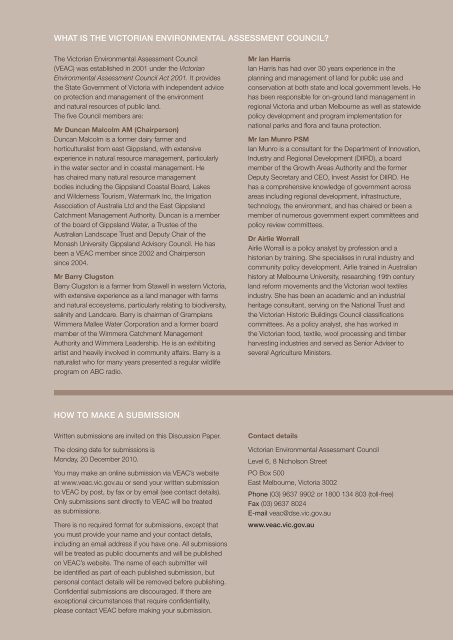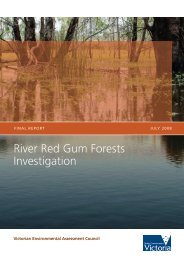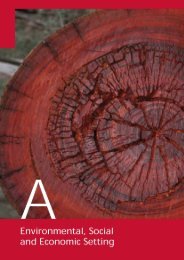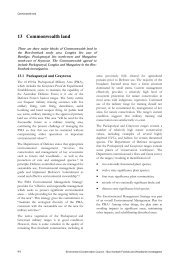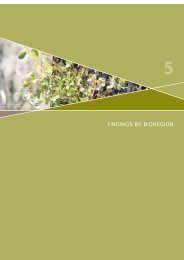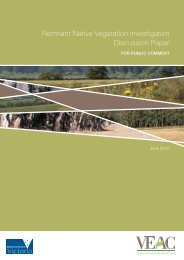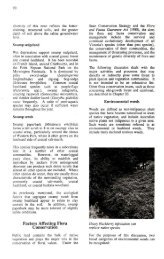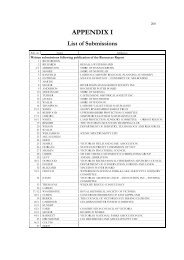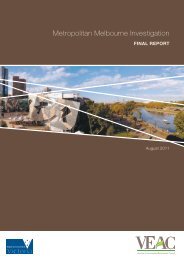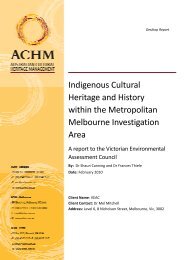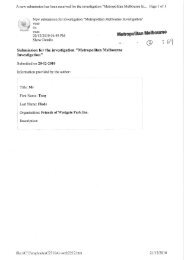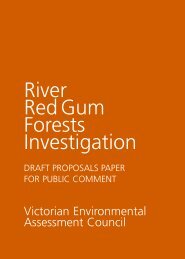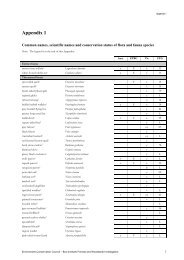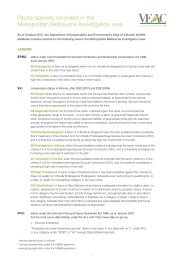Metropolitan Melbourne Investigation Discussion Paper - Victorian ...
Metropolitan Melbourne Investigation Discussion Paper - Victorian ...
Metropolitan Melbourne Investigation Discussion Paper - Victorian ...
Create successful ePaper yourself
Turn your PDF publications into a flip-book with our unique Google optimized e-Paper software.
WHAT IS THE VICTORIAN ENVIRONMENTAL ASSESSMENT COUNCIL<br />
The <strong>Victorian</strong> Environmental Assessment Council<br />
(VEAC) was established in 2001 under the <strong>Victorian</strong><br />
Environmental Assessment Council Act 2001. It provides<br />
the State Government of Victoria with independent advice<br />
on protection and management of the environment<br />
and natural resources of public land.<br />
The fi ve Council members are:<br />
Mr Duncan Malcolm AM (Chairperson)<br />
Duncan Malcolm is a former dairy farmer and<br />
horticulturalist from east Gippsland, with extensive<br />
experience in natural resource management, particularly<br />
in the water sector and in coastal management. He<br />
has chaired many natural resource management<br />
bodies including the Gippsland Coastal Board, Lakes<br />
and Wilderness Tourism, Watermark Inc, the Irrigation<br />
Association of Australia Ltd and the East Gippsland<br />
Catchment Management Authority. Duncan is a member<br />
of the board of Gippsland Water, a Trustee of the<br />
Australian Landscape Trust and Deputy Chair of the<br />
Monash University Gippsland Advisory Council. He has<br />
been a VEAC member since 2002 and Chairperson<br />
since 2004.<br />
Mr Barry Clugston<br />
Barry Clugston is a farmer from Stawell in western Victoria,<br />
with extensive experience as a land manager with farms<br />
and natural ecosystems, particularly relating to biodiversity,<br />
salinity and Landcare. Barry is chairman of Grampians<br />
Wimmera Mallee Water Corporation and a former board<br />
member of the Wimmera Catchment Management<br />
Authority and Wimmera Leadership. He is an exhibiting<br />
artist and heavily involved in community affairs. Barry is a<br />
naturalist who for many years presented a regular wildlife<br />
program on ABC radio.<br />
Mr Ian Harris<br />
Ian Harris has had over 30 years experience in the<br />
planning and management of land for public use and<br />
conservation at both state and local government levels. He<br />
has been responsible for on-ground land management in<br />
regional Victoria and urban <strong>Melbourne</strong> as well as statewide<br />
policy development and program implementation for<br />
national parks and fl ora and fauna protection.<br />
Mr Ian Munro PSM<br />
Ian Munro is a consultant for the Department of Innovation,<br />
Industry and Regional Development (DIIRD), a board<br />
member of the Growth Areas Authority and the former<br />
Deputy Secretary and CEO, Invest Assist for DIIRD. He<br />
has a comprehensive knowledge of government across<br />
areas including regional development, infrastructure,<br />
technology, the environment, and has chaired or been a<br />
member of numerous government expert committees and<br />
policy review committees.<br />
Dr Airlie Worrall<br />
Airlie Worrall is a policy analyst by profession and a<br />
historian by training. She specialises in rural industry and<br />
community policy development. Airlie trained in Australian<br />
history at <strong>Melbourne</strong> University, researching 19th century<br />
land reform movements and the <strong>Victorian</strong> wool textiles<br />
industry. She has been an academic and an industrial<br />
heritage consultant, serving on the National Trust and<br />
the <strong>Victorian</strong> Historic Buildings Council classifi cations<br />
committees. As a policy analyst, she has worked in<br />
the <strong>Victorian</strong> food, textile, wool processing and timber<br />
harvesting industries and served as Senior Adviser to<br />
several Agriculture Ministers.<br />
HOW TO MAKE A SUBMISSION<br />
Written submissions are invited on this <strong>Discussion</strong> <strong>Paper</strong>.<br />
The closing date for submissions is<br />
Monday, 20 December 2010.<br />
You may make an online submission via VEAC’s website<br />
at www.veac.vic.gov.au or send your written submission<br />
to VEAC by post, by fax or by email (see contact details).<br />
Only submissions sent directly to VEAC will be treated<br />
as submissions.<br />
There is no required format for submissions, except that<br />
you must provide your name and your contact details,<br />
including an email address if you have one. All submissions<br />
will be treated as public documents and will be published<br />
on VEAC’s website. The name of each submitter will<br />
be identifi ed as part of each published submission, but<br />
personal contact details will be removed before publishing.<br />
Confi dential submissions are discouraged. If there are<br />
exceptional circumstances that require confi dentiality,<br />
please contact VEAC before making your submission.<br />
Contact details<br />
<strong>Victorian</strong> Environmental Assessment Council<br />
Level 6, 8 Nicholson Street<br />
PO Box 500<br />
East <strong>Melbourne</strong>, Victoria 3002<br />
Phone (03) 9637 9902 or 1800 134 803 (toll-free)<br />
Fax (03) 9637 8024<br />
E-mail veac@dse.vic.gov.au<br />
www.veac.vic.gov.au


